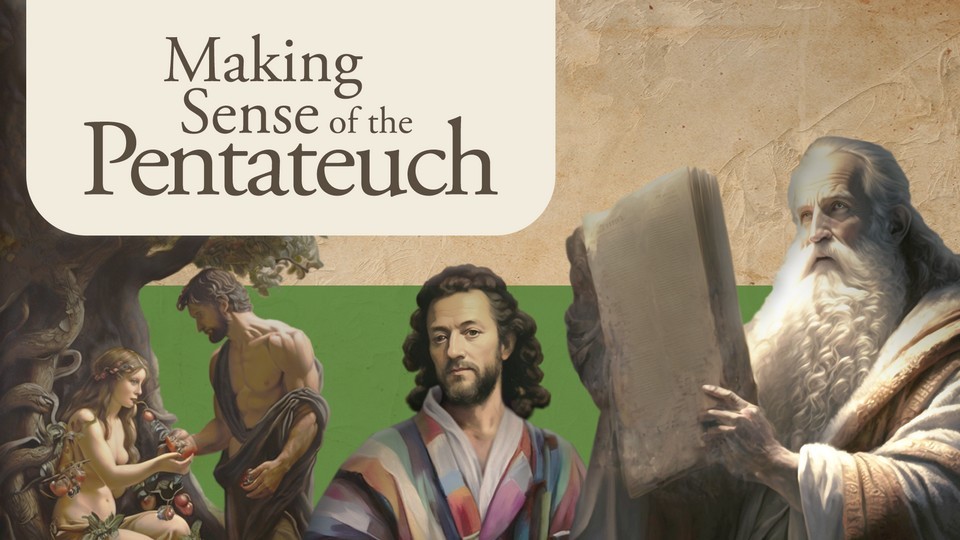
This, the second of the 'Sunday School for Grown-Ups' courses, ran over 10 sessions from April to October 2024.
After sessions introducing the Old Testament and the nature and composition of the Pentateuch, we looked in turn at Genesis, Exodus, Leviticus, Numbers and Deuteronomy, seeking to understand their nature and message. The course concluded with sessions on how we are meant to read the Pentateuch and how the Pentateuch is used by Paul in his letters
All sessions were led by Stephen Kuhrt, except where otherwise stated.
| Session | Topic and scope |
|---|---|
|
1 |
Introduction to the Old Testament. We began with an overview of the Old Testament, to gain an appreciation of the basic shape of the Old Testament, to gain an understanding of the historical setting in which it is claimed that different parts of the Pentateuch were written. We considered the traditional division of the Old Testament in the Christian Bible into four sections (the Pentateuch, the History Books, the Wisdom Literature and the Prophets) - and the contrast with the order and division within the Jewish Bible - before launching into an overview of each of the 39 books. |
|
2 |
The Nature and Composition of the Pentateuch. This session considered the diverse nature of the Pentateuch and the so-called Documentary Hypothesis which aimed to explain this and its development. We looked at how the scholar Julius Wellhausen identified different sources drawn on within the Pentateuch - the Yahwist (J), Elohist (E), Deutoronmist (D) and Priestly (P) - and how this dominated thinking on the Pentateuch until around 1975, when the consensus began to be increasingly questioned. The current approach of biblical scholars,focusing more on the literary structure (of which The Bible Project is an outstanding example) is now seen as a better way of analysing and understanding the theological message of the Pentateuch. |
|
3 |
Genesis 1-11. Covering the first eleven chapters of Genesis, which contains some of the most familiar stories in the Bible, its organisation and genre (the kind of literature we are dealing with), and how it establishes crucial foundations for understanding the story that follows in Genesis 12-50 and the rest of the Pentateuch. |
|
4 |
Genesis 12-50. Covering the remaining chapters of Genesis and its focus on the life of one family: Abraham and his descendants. We looked at the three main narratives within these chapters - the story of Abraham, the story of Jacob and Esau, and the story of Joseph and his brothers. |
|
5 |
Exodus. Taking its name from the the defining moment in Israel's history, the exodus of the Israelites from Egypt, the book moves from a family history towards the history of the people of God. We began by looking at the debates surrounding the historicity of the exodus and of Moses himself, before examining the structure of the book and the key events within its narrative. |
|
6 |
Leviticus. The session began with a discussion of how negative evaluations of Leviticus have been reshaped by the New Perspective on Paul, and how we should understand the key concepts of holiness and purity. We then moved on to look at the books structure and content within its four parts: laws on sacrifice, the institution of the priesthood, uncleanness and its treatment, and prescriptions for practical holiness. |
|
7 |
Numbers. Also known by its Hebrew title 'In the Wilderness', the book covers the 40 years in which the Israelites travelled from Mount Sinai to Mount Nebo. The session focused on its structure and content, seen as three sections on law-giving interspersed with two journeys: from Sinai to Kadesh, and from Kadesh to the plains of Moab. |
|
8 |
Deuteronomy. Comprising the final sermons of Moses that bring the Pentateuch to its climax, the book is arguably the most influential book in the Bible, as well as being the first of its prophetic books. We considered the debates about the dating of its composition and the challenge posed by Gordon McConville who argued that the book is less concerned with legal precsion and more about encouraging people to keep the law. The session moved on to examining the structure of the three sermons in more detail. |
|
9 |
How are we to read the Pentateuch? Led by Nathan Larkin, this session considered the different literary genres that feature in the Pentateuch, and how we are meant to read and interpret them. |
|
10 |
Paul's Use of the Pentateuch. Led by Katy Loffman, this session focused on how Paul uses the Pentateuch in his letters, covering Paul's use of stories, symbols and principles from the Old Testament. |
